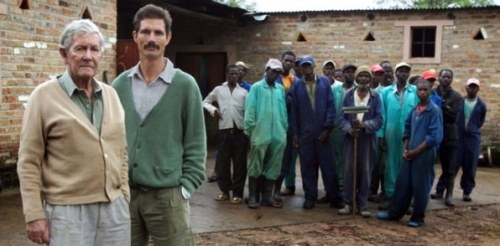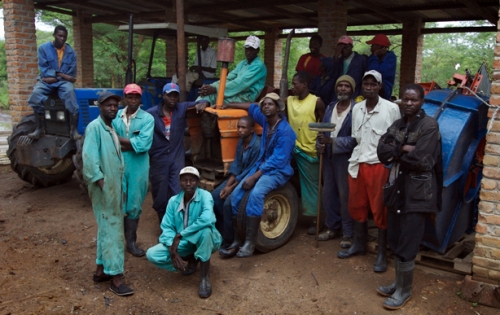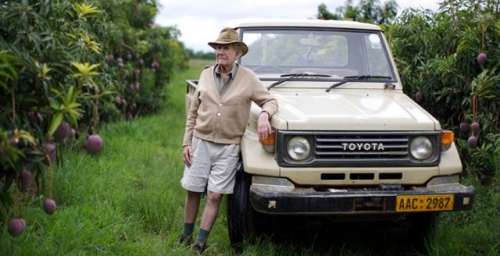Mt Carmel Farm
"This is a community," explains Ben Freeth, Mike's son-in-law. "We've got 500 people that live on this farm: workers, wives, children. And it's home for us all."

"I didn't have the money so I had to get a loan from the Land Bank, a loan which, I might add, took me twenty years to repay. Almost to the year after repaying it and getting the title deeds the government said 'We'll have that thank you very much!' And we've been fighting for it ever since." Mike Campbell.
"Mike Campbell has been persecuted for the unique offence of living in his own house and farming his own land to which he holds the title deeds. A farm which he acquired after 1980, after Independence, purchased on the open market and on a certificate of 'No Interest' by the Zimbabwean government." Jeremy Gauntlett - Lead Counsel.
Mike Campbell is 75 years old. He moved to Mount Carmel farm in 1974, a 3,000 acre plot which he began stocking with game and where, as well as maintaining crops of Maize and Mangos he eventually opened a safari lodge by the river that runs through the land.

"Until three years ago we had 45 giraffes, 300 impala, 150 wildebeest, 50 eland, waterbuck, warthogs, zebra, game birds . . . It was a paradise. But these guys have systematically killed them and now we have nothing..."
The problems for Mike, his family and the workers who live and farm on Mount Carmel, began in November 1997 when the property was listed for acquisition as part of the government's 'Land Reform' programme. A scheme that has little to do with equitable land redistribution since the properties seized are only those belonging to white farmers and the beneficiaries are not hitherto disenfranchised african peasants who have been deprived of the opportunity to own land and who would farm it well. The land is in fact allocated to senior political associates, VIPs and wealthy friends and flunkeys of Mugabe and his government, few if any have any knowledge or interst in maintaining the businesses on the seized land. As a result the agricultural sector, Zimbabwe's primary export industry is left ravaged, and once profitable farms providing jobs for so many, are reduced to wastelands. Mike feels a keen sense of responsibility for his workers who, despite the dangers of doing so, remain loyal to him and who look to him to protect their futures.
"We love these guys. They've been here a long time. They're loyal to us. We give them a square deal. If we lose the farm, they lose their livelihood aswell." Mike Campbell.
The war vets arrived on the property in 2000. "About 20 or 30 turned up and I gave them a shed to live in because I didn't want them chopping my trees to build their huts." After a year with Campbell refusing to leave they moved off onto adjoining land owned by Mike's son Bruce. They have stayed there to this day, making it impossible for Bruce to farm. They comtinue to make regular forays on to Mike’s farm, where they set fire to his lodge and hay bales and threaten and beat his security guards who patrol the site day and night.
"Since the land invasions began in 2000, we've had many encounters with Mugabe's ZANU PF activists. They can arrive unannounced at any time. We have to be constantly on our guard..."
"It was a bad time, particularly at the beginning of the land invasions, as anyone who showed any resistance was taken out, some even horribly murdered in front of police, so we realised there was no protection and every man for himself... Nobody wanted to stand together and we all went our own ways and the government gradually picked us off one by one until there were very few us left."
"This whole land issue has really divided the white community. For me the white reaction has been the most distressing thing. I haven't felt hatred towards Mugabe himself, but I've felt anger and resentment towards the white community. We've been totally isolated because of the stand we've taken. Dad and Ben haven't been invited to any farmers' meetings for six years. I've had women turn and walk away in the Chegutu club. We're not wanted because we rock the boat." Laura Freeth, Mike's daughter.
The man planning to move into Campbell's farm is one of the country's big men, Nathan Shamuyarira, official spokesman for the ruling Zanu-PF party. Campbell is undaunted, though he knows what he is taking on. One Sunday lunchtime three years ago, a delegation arrived at Campbell's farm. One of them was Shamuyarira, who offered to let Campbell stay on as manager. Campbell was having none of it.
"We told Shamuyarira, if you want my farm you will have to steal it and you will have to kill me, so then you will be guilty of murder too!" Mike Freeth.
He admits he would not be able to carry on without the support of his family and their strong Christian faith. But they have paid a high price, and not just in terms of property. The war vets who took over Bruce's farm brought cerebral malaria into the valley, killing 11 workers. When Bruce's wife Heidi was four months pregnant with twins, she caught it and died, leaving him a single parent to their five-year-old daughter. "That was the hardest blow to the family," said Campbell's daughter Laura, who also lives on Mount Carmel in an adjoining farmhouse with her husband Ben and three children.

"Their plan is to remove every white farmer off the land. And now we've gone to an International Court and I think this is the last chance we've got to keep white farmers here. If we win this case the whole Land Reform programme in Zimbabwe becomes illegal and every farmer who's been kicked off his land has the right to come back to his farm." Mike Campbell.
"This case is a direct challenge to Robert Mugabe and his government but its also a challenge to the rest of the world. We want the world to wake up to the injustices of what is happening in Zimbabwe. A country without a rule book is rather like a football game or a rugby game that doesn't have rules, doesn't have a referee. It would just end up in chaos with lots of people getting hurt. And that's exactly whats happening in Zimbabwe at the moment. People are just playing by their own rules. There's no-one blowing any whistles at the moment, there's no-one keeping to any of the rules of the game. And that's why we need to bring referees in from outside who are prepared to make sure that the rules are upheld." Ben Freeth.
"I think God does challenge us. He stretches our faith. He puts us in situations that are difficult and he's almost saying 'Do you trust me in this? Do you believe that I will take care of you, even in these hard times?' Actually trusting God is the only way we'll get through it. We can't trust anything else." Angela Campbell, Mike's wife.
















